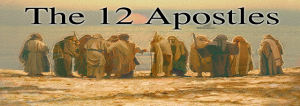
Pastor Rich Knight
Central Congregational Church
April 22, 2018
Luke 6:12-19
You’ll notice in the passage a distinction made between the words, “disciple” and “apostle.” Apostle means, one who is sent. Even though Jesus is selecting the disciples to be with him, to learn and serve with him, Christ’s ultimate purpose for them is to send them out into the world to share the Good News and continue his ministry. Jesus had many followers, many disciples, men & women; but 12 were hand-picked by him to travel with him, minister with him and learn from him, and then carry out his ministry. These we call, The Twelve Disciples or the Apostles.
Luke 6:12-19
Now during those days he went out to the mountain to pray; and he spent the night in prayer to God. And when day came, he called his disciples and chose twelve of them, whom he also named apostles: Simon, whom he named Peter, and his brother Andrew, and James, and John, and Philip, and Bartholomew, and Matthew, and Thomas, and James son of Alphaeus, and Simon, who was called the Zealot, and Judas son of James, and Judas Iscariot, who became a traitor. He came down with them and stood on a level place, with a great crowd of his disciples and a great multitude of people from all Judea, Jerusalem, and the coast of Tyre and Sidon. They had come to hear him and to be healed of their diseases; and those who were troubled with unclean spirits were cured. And all in the crowd were trying to touch him, for power came out from him and healed all of them.
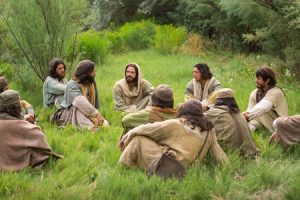
Margaret Mead famously once said: “Never doubt that a small group of thoughtful, committed, citizens can change the world. Indeed, it is the only thing that ever has.”
If ever a group of people embodied that truth, it was the original 12 disciples, a small band of brothers who changed the world.
And they were very ordinary people.
- None of them were famous at the time.
- None of them were powerful or influential.
- None of them were wealthy or high up on the social strata.
They were not chosen for their intellect, their education, or any superior ability. They were ordinary. We know for sure that half of them were fishermen: Andrew, James, John, Peter, Philip, Simon the Zealot. In the First Century, nothing was more ordinary that fishing.
William Barclay says: “It’s almost like Jesus said to the Father, ‘Give me 12 ordinary people, and I will change the world.’” And God did and they did.
And of course, there’s a lesson right there. God uses ordinary people, like you and me. We should never feel that God can’t use us to do extraordinary things.
God seems to enjoy taking the ordinary and doing something extraordinary with them.
So that’s the first lesson in discipleship that I’d like us to see this morning. God loves using ordinary people!
The second lesson is this: not only were the Disciples ordinary, they were also truly flawed individuals, and therefore, again jordan luka 3 colorways release dates . . . a lot like us!
Think about the nickname Jesus gave James & John. He called them the “Sons of Thunder.” – do you think it’s because they were soft-spoken, mild-mannered gentlemen? No! Just the opposite, right? They were loud, boisterous, argumentative & volatile.
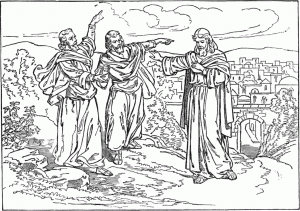
In Luke 9, they had just left a town that didn’t receive Christ and his message, and so they asked Jesus, “Should we call down fire from heaven now and burn the town down?” (Luke 9:54) “No. That’s not a good idea.”
James and John sometimes were a little to ambitious and a little too full of themselves. In Mark 10: they ask Jesus, “Hey, when we all get to heaven, we picture you on a glorious throne. Could we have the seats just to your right and your left?” (Mark 10:37) “No. And stop worrying the seating arrangements in heaven. If you’re worried about that, you’re not getting it!”
The disciples made tons of mistakes in their three years with Jesus. The night before the Cross, Jesus went to the Garden of Gethsemane and he asked Peter, James & John to stay with him and pray with him (Matthew 26:36-46). And what did they do? The fell asleep.
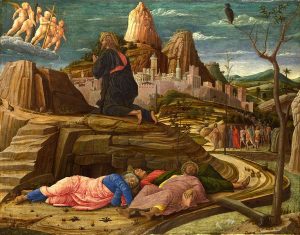
“Agony in the Garden” by Andrea Mantegna (1431-1506)
Three times Peter denied he ever knew Jesus. Following Christ resurrection, they were still slow to believe. Even after discovering the empty tomb, the disciples went back to their normal routines. “They returned to their homes.” And the next day they went fishing.
Jesus must have thought to himself, “These guys are going to carry on my ministry? These are the pillars of this movement? I obviously didn’t spend enough time praying on that mountain!
Jesus did get frustrated with them, but he never gave up on them, because “love is patient.” Disciples aren’t judged by the standard air jordan 1 mid outlet of perfection. Instead they’re accepted by grace, and then loved into becoming the best they can be.
Jesus correctly saw their potential. John, the Son of Thunder, became the Apostle of Love. Peter, became the key leader of the early church. Even though he denied Christ, his name is listed first in every listing of the apostles
So God not only uses ordinary people like you and me, God also uses flawed people like you and me!
There’s one other important truth in this passage that’s not obvious at first.
Jesus did not choose his band of brothers because they all thought the same way. He did not choose them because they all had the same political and religious views, and therefore he knew they’d all get along. Not at all. In fact, two of them would have been political enemies in the strongest of terms.
Matthew the Tax Collector and Simon the Zealot.

The Zealots believed in the violent overthrow of Rome. They hated anyone who cooperated with the Romans. In fact, they often killed those who cooperated with the Romans. And who was Matthew collecting taxes for? The Romans! This is why tax collectors were outcasts. They were traitors, conspiring with the enemy. They were also viewed as corrupt and unjust, since they often demanded tax payments that were much higher than required, and they pocketed the excess.
So Simon the Zealot and Matthew the Tax Collector would have been mortal enemies. It would have taken a lot to overcome that. In fact, it took their commitment to Christ to overcome that.
I’ve never served a church where everyone agreed on everything. That would be boring. There are some churches that have more uniformity when it comes to political & social issues, but most of our churches are a lot like those first disciples – diverse and on opposite sides of some important issues. But like those disciples we pull 020 - Бігові кросівки asics gel - Asics Gel Kayano 14 (Silver / Dark Green) 1203A537 - Cheap Gmar Jordan Outlet together to follow Jesus. We see that nothing is more important than following Christ, and what we have in common in him is more important than anything travis scott air jordan 1 retro low og black olive release date fall 2024 else. That’s what Simon & Matthew learned along the way.
Well, that’s a brief look at the 12 Disciples. They were ordinary, flawed and diverse. That seems to be exactly what Jesus wanted.
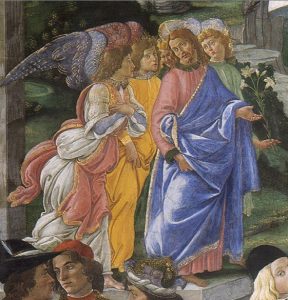
Angels with Christ by Botticelli, Sistine Chapel
Let me close with one of my favorite stories. It’s an apocryphal story about what happened when Jesus returned to heaven following his ministry on earth. The angels gathered around him to hear the report. Jesus told them about being born in Bethlehem, about the miracles and teaching the Good News of God, about his atoning sacrifice and victorious resurrection.
When he finished Gabriel, the arch angel spoke up and said,
“What will happen now?”
“I’ve left my work in the hands of a small of band of followers, fishermen mostly. They will carry on my ministry. They will share the Good News.”
“Well what if that doesn’t work?” said Gabriel. “What’s the plan then?”
Jesus said, “There is no other plan.”
There is no other plan. The work of the Kingdom, the ministry of Christ, the message of Good News is in our hands, Disciples. Let’s take courage from what Jesus did with those first group of ordinary, flawed and diverse disciples. If he could do it with them. He can do it with us! Amen.
Benediction:
The first disciples were ordinary people,
but an extraordinary Savior did extraordinary things with them.
The first disciples were truly flawed,
but that didn’t stand in God’s way.
The first disciples were diverse,
but they found their unity, their purpose, their cause, their oneness in Jesus Christ.
May it always be so with us!
The Grace of our Lord Jesus Christ,
The Love of God our Creator,
And the Joy and Strength of the Holy Spirit be with you this day and always.
Amen.
